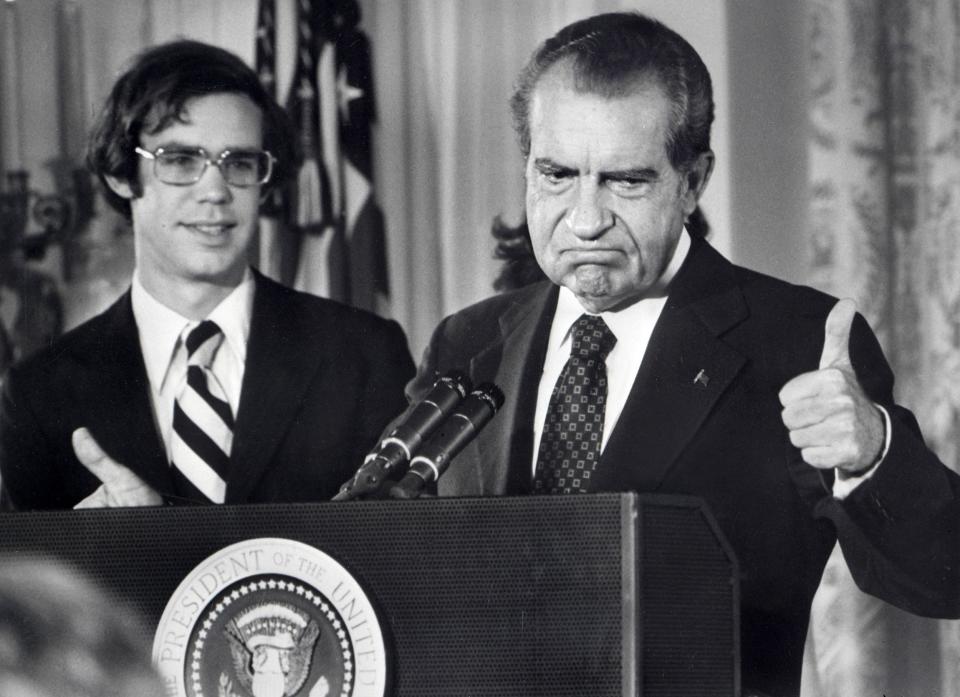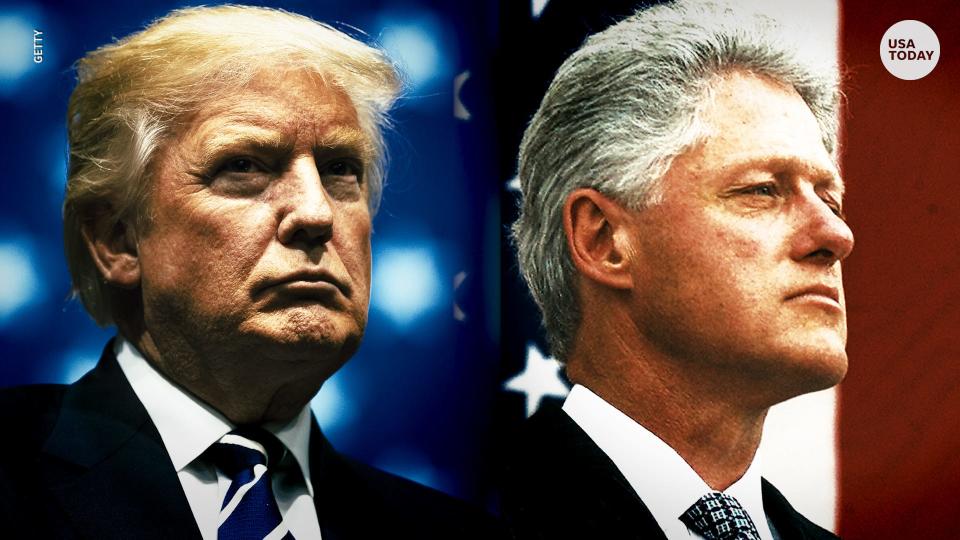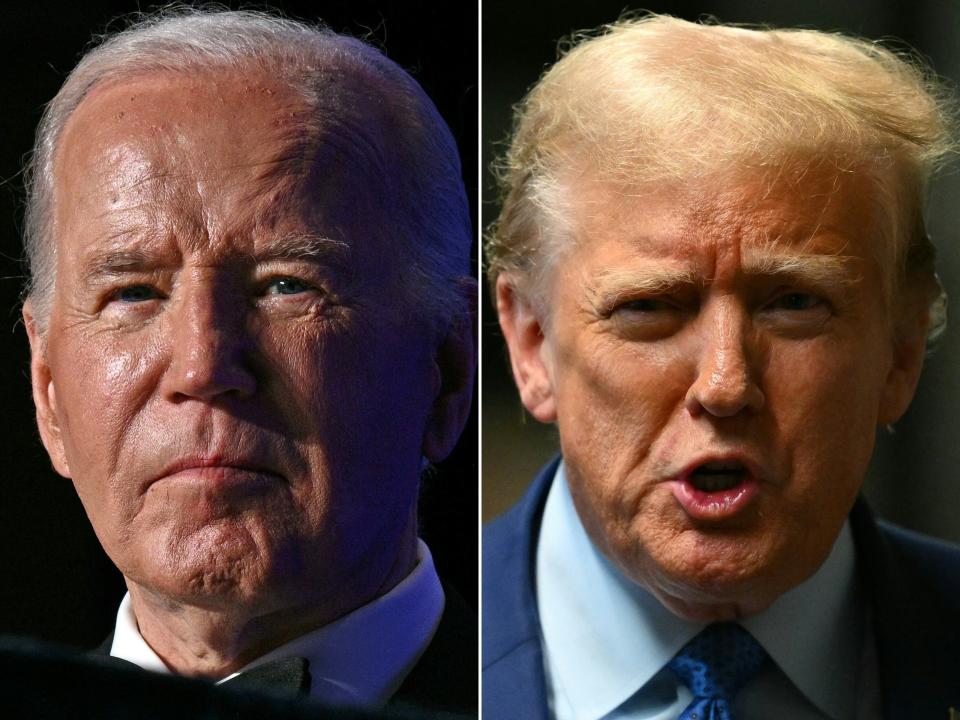A single word uttered 34 times in a Manhattan courtroom on Thursday afternoon changed American history.
“Guilty.”
That was the outcome delivered from a 12-person New York jury that found former President Donald Trump culpable on all 34 felony counts of falsifying business records to commit or conceal another crime. The criminal case centered around allegations that he attempted to cover up a $130,000 hush-money payment to an adult film actress so that it wouldn’t hurt his prospects in the 2016 presidential election.
Trump is now the first former U.S. president convicted of a crime. He’s also the first person convicted of a felony who is on track to become a major party presidential nominee. Experts told USA TODAY the event is a triumph for the rule of law − for now − regardless of whether it affects the outcome of the next election.
It’s hardly the first time Trump has made history. He was the first president without government or military experience, the first president to refuse to commit to a peaceful transfer of power and the first president impeached twice. This latest first will forever mark his legacy.
While political scientists and historians were divided over whether the verdict would influence the 2024 presidential election in any measurable way, they did agree on one immutable fact – the verdict will rewrite history books.
The biggest takeaway?
“In a nation ruled by laws, not men, no one is above the rule of law,” said Jennifer Mercieca, a professor at Texas A&M University. “Not even a president.”
No moment like this
Other former U.S. presidents have been enmeshed in high-profile legal problems, litigation and congressional investigation stemming from a political scandal. Trump’s New York hush money case has drawn comparisons to the Watergate scandal that ended Richard Nixon’s presidency and then-President Bill Clinton’s impeachment in 1998 during his second term in office.
But Susan Liebell, a political science professor at Saint Joseph’s University in Philadelphia, said those events aren’t equivalent to Trump’s 34 felony convictions because Nixon and Clinton weren’t convicted of a crime. And Liebell said she’s “deeply suspicious” of anyone who says they know what impact the New York verdict will have on American politics based on those prior examples.
“No American president has ever been convicted in a criminal proceeding,” Liebell said. “There are no historical precedents.”
Unlike Trump, Nixon never faced trial. He was pre-emptively pardoned by his successor, Gerald Ford, before he could be criminally prosecuted for his role in the break-in at the Democratic National Committee headquarters and subsequent coverup. Nixon resigned from office two years into his second term in 1974 as momentum grew in Congress for his impeachment, and the Republican president never again ran for public office.

Trump, meanwhile, has only served one term in the White House and is now the presumptive GOP nominee for president − and he has shown no plans of ending his latest bid for president as a result of Thursday’s verdict. Trump remained defiant and unremorseful throughout the trial, saying he “didn’t do anything wrong.”
Jeffrey Engel, director of presidential history projects at Southern Methodist University, argued that while “Nixon is not typically whom historians turn to for examples of exalted presidential behavior,” the former president “knew the job, and the country, was bigger than himself.”
“To date, Donald Trump does not,” Engel said.
Engel and Shannon O’Brien, a professor and self-described “presidency nerd” at the University of Texas at Austin, also pushed back on comparisons to Clinton’s 1998 House impeachment for lying to investigators and obstruction of justice tied to a sexual affair with intern Monica Lewinsky.
While Trump and Clinton’s cases both “involved sexual issues,” O’Brien said “that’s about where the close comparisons end.”
The Senate acquitted Clinton after his House impeachment, and the Justice Department didn’t pursue federal criminal penalties against the Democrat due to a policy dating to Nixon’s time that sitting presidents cannot be charged with crimes while in office. Clinton also reached an agreement with the Justice Department on his final full day in the White House to avoid post-presidential prosecution on a related matter in exchange for paying a fine, a 5-year suspension of his law license and a public admission of unprofessional conduct.
By comparison, Trump was found guilty on Thursday on 34 state felony counts by a 12-person jury. He also still faces criminal charges in three other jurisdictions − two federal cases and a state case in Georgia − tied to allegations he tried to overturn the 2020 presidential election that he lost and kept classified materials in his possession after leaving the White House and then obstructing the investigation into the matter. The former president has pleaded not guilty to all the charges.


President Clinton’s career as an elected official ended after his two terms in the White House. However, Engel suggested that the Democratic president’s scandals undercut then-Vice President Al Gore’s 2000 White House campaign that concluded with a razor-thin loss to George W. Bush.
“If Trump loses, we will say that the lesson of Clinton, and then of all presidents, is that there are places the electorate won’t go to support a candidate,” Engel said. “Right now, the line is at felony conviction. That line may well move by November.”
A constitutional victory
Historians described the verdict in Trump’s trial as a win for some of the most heralded legal principles in the country, chief among those being the phrase “equal justice under the law” that is inscribed at the top of the U.S. Supreme Court building.
Engel argued that the “men who wrote the Constitution would be pleased” that the political system they designed did not buckle. Instead, as intended, he argued, a former commander-in-chief received the same treatment in the justice system as any other American citizen.
A New York grand jury last year found that there was sufficient evidence to bring a case against Trump for the hush money payments. After listening to that evidence in a Manhattan courtroom over the past six weeks, the 12-person jury of Trump’s peers found the ex-president guilty beyond a reasonable doubt.
“He was not convicted by President Biden or his political enemies but unanimously and quickly by a jury of 12 ordinary Americans,” said Allan Lichtman, a professor of history at American University.
Engel and Lichtman, however, expressed concern that Trump’s response to the verdict could erode trust in U.S. institutions that allowed for the former president’s trial to take place.
“They will say New Yorkers are too biased to be fair; that a jury can be persuaded by a reckless prosecutor or a manic judge; that the entire trial was political,” Engel said of Trump and his allies.
Indeed, minutes after the jury read out its decision, Trump described his New York verdict as “a disgrace” and vowed to fight his felony convictions. House Speaker Mike Johnson, R-La., similarly framed the case as a “weaponization of our justice system” by Democrats to prevent Trump from retaking the presidency.
O’Brien argued that Trump and his supporters were making unfounded allegations of bias from the New York courts because accepting its legitimacy would harm their side’s political prospects.
“He cannot respect a system that holds him accountable,” O’Brien said. “He has to tear it down because he is out of other options.”


An uncertain future
Shortly after the trial’s conclusion on Thursday, Trump argued that the “real verdict” on his innocence will come on Election Day.
The latest RealClearPolitics Average of national polls shows Trump and President Joe Biden stuck in a dead heat, with Trump holding a marginal lead.
The experts responding to USA TODAY said they were split over how Trump’s felony conviction will affect his chances of victory. They noted that Trump’s campaign is expected to use the verdict to drum up support and fundraising among his base. What’s more unknown, however, is the way it will influence swing voters.
“We have no idea how voters will react,” Liebell said. “The question is how it affects independent voters and Republicans who may agree with conservative policies but have concerns about corruption and integrity.”
She pointed to an Ipsos poll from April that found roughly 40% of Republicans and two-thirds of independents considered the hush money charges to be serious. Of those who said they would vote for Trump if the election was held at that moment, 13% said they wouldn’t vote for him if he was convicted of a felony by a jury. An additional 25% said they wouldn’t support him if he was serving a prison sentence at the time of the election.
Given the tight margins in the presidential race, Lichtman suggested that a small defection of moderate voters away from Trump could be enough to hamper the Republican’s chances of victory.
Litchman has correctly forecast the winner of most presidential elections since 1984, with the exception of the race in 2000. While he hasn’t made a final prediction this year, he said “a lot would have to go wrong for Biden to lose reelection.”
This article originally appeared on USA TODAY: How Trump’s criminal conviction is already rewriting American history


